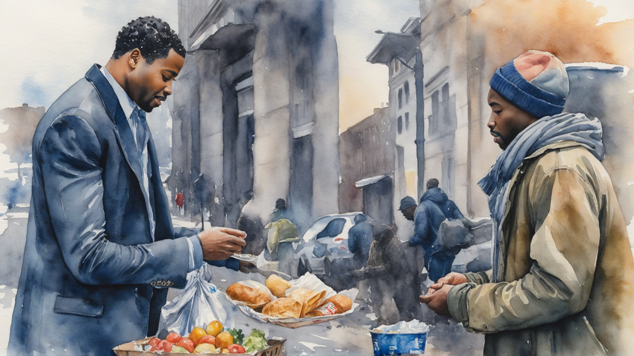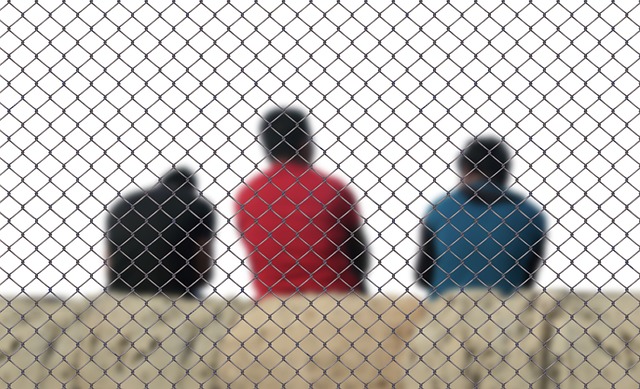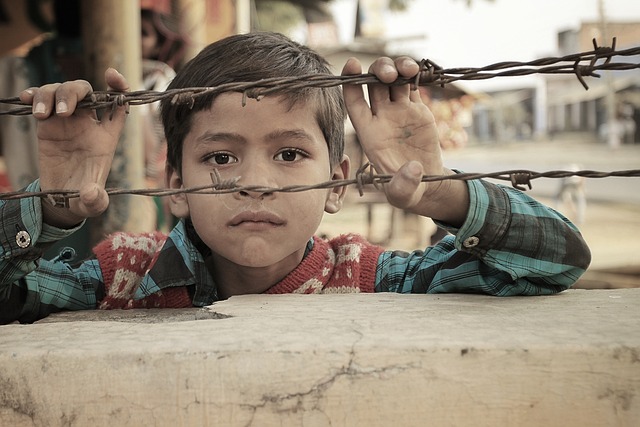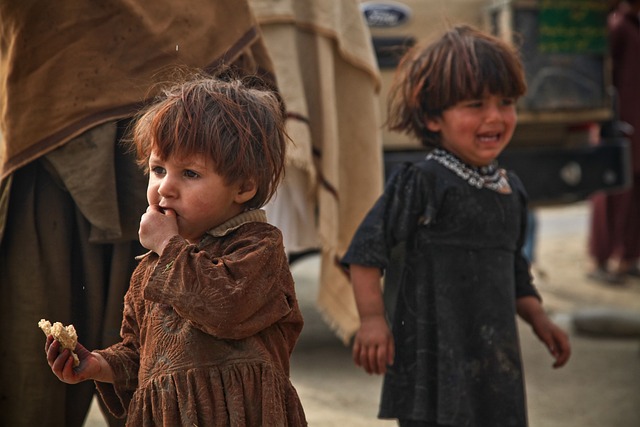Living Divine Mercy: Transforming Lives Through Compassionate Action

Introduction:
As we gather on this sacred day of Divine Mercy Sunday, we are called to pause and reflect on the profound significance of this occasion within the Catholic faith. Rooted in the teachings of Jesus Christ and inspired by the writings of Saint Faustina Kowalska, Divine Mercy Sunday serves as a poignant reminder of God’s boundless love and unfathomable mercy towards humanity. This special day, instituted by Saint John Paul II in the year 2000, falls on the second Sunday of Easter, a time when we joyfully celebrate Christ’s resurrection and victory over sin and death.
In the Gospel of John, Chapter 20, verses 19-23, we encounter the powerful moment when the risen Christ appears to his disciples, offering them peace and imparting the gift of the Holy Spirit. This passage underscores the central theme of Divine Mercy Sunday, as Jesus bestows upon his followers the authority to forgive sins and reconcile humanity to God. It is a moment of profound grace and divine compassion, symbolizing the transformative power of mercy in our lives.
In the midst of the unprecedented challenges and uncertainties of our times, the message of Divine Mercy resonates more deeply than ever before. As we grapple with global crises, personal struggles, and societal injustices, the need for mercy becomes increasingly evident. In the Gospel of Matthew, Chapter 5, verse 7, Jesus declares, “Blessed are the merciful, for they shall obtain mercy.” These words remind us of the reciprocal nature of mercy – as we extend compassion and forgiveness to others, we ourselves are recipients of God’s abundant mercy and grace.
As we go deeper into the essence of Divine Mercy and its relevance in our lives, let us journey together in exploring the theological significance of this profound concept. Join me as we embark on a transformative exploration of mercy, its manifestations in our daily existence, and the imperative for us as Christians, particularly as Catholics, to embody mercy in the challenging times we face..

Section 1: Understanding Divine Mercy
In the depths of our souls, we yearn for a love that transcends our faults and failures, a love that sees us not as we are, but as we can become. This yearning finds its fulfillment in Divine Mercy, a concept that pierces through the darkness of our struggles and offers a beacon of hope and redemption.
Divine Mercy and Its Theological Significance:
Divine Mercy is the essence of God’s love manifested in His infinite compassion and forgiveness towards humanity. It is not merely a theological doctrine but a profound revelation of God’s character, rooted in His unwavering desire for reconciliation with His creation. As the prophet Micah declares, “Who is a God like you, pardoning iniquity and passing over transgression for the remnant of his inheritance? He does not retain his anger forever, because he delights in steadfast love” (Micah 7:18). Divine Mercy reveals God’s boundless love, which knows no limits and extends to even the most broken and undeserving of souls. It is through the sacrificial death and resurrection of Jesus Christ that the full extent of Divine Mercy is unveiled, offering humanity the gift of salvation and eternal life.
Mercy as part of Christianity and Its Roots in the Teachings of Jesus Christ:
Mercy lies at the heart of Christianity, echoing the teachings and example of Jesus Christ Himself. In the Gospel of Luke, Jesus exhorts His followers, saying, “Be merciful, even as your Father is merciful” (Luke 6:36). Through His ministry, Jesus demonstrates the transformative power of mercy, reaching out to the marginalized, forgiving sinners, and healing the brokenhearted. The parable of the Good Samaritan (Luke 10:25-37) vividly illustrates the radical nature of mercy, challenging us to extend compassion and kindness to all, regardless of social status or background. Thus, mercy in Christianity finds its roots in the life and teachings of Jesus Christ, who embodies the very essence of Divine Mercy.
Divine Mercy as a Central Theme in Catholic Theology and Spirituality:
Within the Catholic tradition, Divine Mercy is not merely a theological concept but a lived reality that permeates every aspect of faith and spirituality. Pope Francis reminds us, “God never tires of forgiving us; we are the ones who tire of seeking his mercy” (Homily, March 17, 2013). The devotion to Divine Mercy, as revealed to Saint Faustina Kowalska, emphasizes the transformative power of God’s mercy in the lives of believers. Through the sacraments, particularly the Sacrament of Reconciliation, Catholics experience firsthand the healing and liberating effects of God’s mercy. Divine Mercy Sunday, instituted by Saint John Paul II, serves as a solemn reminder of God’s unconditional love and forgiveness, inviting believers to embrace the mercy of God and extend it to others.

Section 2: Embracing the Power of Mercy
Mercy, oh mercy! It’s the heartbeat of God’s love pulsating through the universe, beckoning us to dive deep into its infinite depths. It’s more than just a word; it’s a divine force that has the power to transform lives, heal wounds, and mend brokenness. Let’s journey together into the essence of mercy, where passion meets compassion, forgiveness meets redemption, and justice meets advocacy.
Mercy: Compassion in Action
Picture this: a compassionate hand reaching out to lift the downtrodden, a tender embrace comforting the brokenhearted, and a listening ear offering solace to the weary soul. That’s mercy in action! It’s the fierce love that refuses to turn a blind eye to the suffering of others but instead, dives headfirst into the messiness of life to offer comfort and hope. As Saint Paul exhorts us, “Be kind to one another, tenderhearted, forgiving one another, as God in Christ forgave you” (Ephesians 4:32). Let us, too, be vessels of mercy, overflowing with compassion and kindness towards all.
Mercy: Forgiveness Unleashed
Imagine the weight of guilt and shame lifted off your shoulders as you receive the gift of forgiveness. That’s the power of mercy in action! It’s the liberating force that breaks the chains of resentment and bitterness, paving the way for reconciliation and healing. As Jesus declared on the cross, “Father, forgive them, for they know not what they do” (Luke 23:34). In those words, we find the essence of divine mercy – a love that knows no bounds and offers forgiveness to even the most undeserving of souls. Let us extend that same mercy to others, forgiving as we have been forgiven.
Mercy: Justice Roaring
Picture a world where justice rolls down like mighty waters, where the cries of the oppressed are heard and the marginalized find refuge and hope. That’s the vision of mercy unleashed! It’s the fierce determination to stand up for the rights and dignity of all God’s children, especially those who have been pushed to the margins of society. As the prophet Micah declares, “He has told you, O man, what is good; and what does the Lord require of you but to do justice, and to love kindness, and to walk humbly with your God?” (Micah 6:8). Let us be champions of justice and advocates for mercy, boldly speaking out against injustice and working tirelessly to build a world where all are treated with dignity and respect.
Mercy is not just a virtue; it’s a way of life, a calling to embody the love and compassion of God in our interactions with others. As we immerse ourselves in the transformative power of mercy, may our hearts be set ablaze with passion, our lives be infused with compassion, and our world be forever changed by the relentless pursuit of mercy in action.

Section 3: Living Mercy as Catholics and Christians
Mercy isn’t just a concept to ponder; it’s a call to action, a radical way of living that reflects the very heart of God. As Catholics and Christians, we are not merely called to believe in mercy; we are called to embody it, to let it permeate every aspect of our lives and to shine forth as a beacon of hope and healing in a broken world. Let’s delve into what it means to live mercy, passionately and unapologetically.
Embracing the Call to Mercy:
Imagine a world where love triumphs over hate, where kindness prevails over cruelty, and where forgiveness reigns supreme. That’s the world God envisions for us, a world infused with the transformative power of mercy. As Pope Francis reminds us, “Mercy is the very foundation of the Church’s life. All of her pastoral activity should be caught up in the tenderness she makes present to believers” (Misericordiae Vultus, 10). Let us heed the call to mercy, allowing it to shape our attitudes, guide our actions, and transform our communities.
Extending Mercy to All:
Picture a table set with an abundance of grace and forgiveness, where all are welcome, regardless of their past mistakes or shortcomings. That’s the table of mercy, where no one is excluded, and all are embraced with open arms. As Jesus proclaimed, “Come to me, all who labor and are heavy laden, and I will give you rest” (Matthew 11:28). Let us follow in the footsteps of our Savior, extending mercy and hospitality to all who are in need, showing compassion and kindness to the stranger, the outcast, and the marginalized.
Advocating for Mercy and Justice:
Imagine a world where mercy and justice walk hand in hand, where the oppressed find refuge and the downtrodden find hope. That’s the world God dreams of for His creation, a world where His kingdom reigns in righteousness and peace. As the prophet Isaiah prophesied, “Learn to do good; seek justice, correct oppression; bring justice to the fatherless, plead the widow’s cause” (Isaiah 1:17). Let us be agents of God’s mercy and justice, standing up for the rights and dignity of all people, especially those who have been marginalized and oppressed.
Living mercy isn’t just a noble aspiration; it’s our sacred duty as Catholics and Christians. As we immerse ourselves in the radical love and compassion of God, may our lives become a living testimony to the transformative power of mercy, touching hearts, healing wounds, and building bridges of reconciliation in a world hungering for God’s mercy.

Section 4: Divine Mercy in Challenging Times
In the midst of life’s storms and trials, Divine Mercy shines forth as a guiding light, offering solace, strength, and hope to weary souls. As we navigate through the turbulent waters of adversity and uncertainty, let us anchor ourselves in the boundless love and compassion of God, drawing inspiration from the example of Jesus Christ and the saints who have gone before us. In this section, we will explore how Divine Mercy manifests itself in challenging times and how we can respond with acts of mercy, both individually and collectively.
Embracing Divine Mercy in Times of Crisis:
When faced with adversity and hardship, it’s easy to lose sight of God’s mercy and compassion. Yet, it is precisely in these moments of darkness that the light of Divine Mercy shines most brightly. As the psalmist proclaims, “The Lord is merciful and gracious, slow to anger and abounding in steadfast love” (Psalm 103:8). Let us cling to this promise, trusting in God’s unfailing love and mercy to sustain us through the storms of life.
Practicing Corporate Acts of Mercy:
Corporate acts of mercy are those actions undertaken by communities, organizations, and societies to alleviate suffering, promote justice, and foster reconciliation. These acts of mercy reflect the collective response of believers to the call of Christ to love one another as He has loved us. Examples of corporate acts of mercy include:
- Providing food, shelter, and support to those experiencing homelessness and poverty.
- Advocating for the rights and dignity of migrants, refugees, and other vulnerable populations.
- Supporting initiatives that promote peace, reconciliation, and social justice.
- Collaborating with local communities to address systemic injustices and inequalities.
- Offering resources and assistance to individuals and families affected by natural disasters, conflicts, and other emergencies.
Drawing Inspiration from Saints and Spiritual Leaders:
Throughout history, saints and spiritual leaders have embodied the spirit of Divine Mercy in their lives, inspiring others to follow in their footsteps. From Saint Mother Teresa, who ministered to the poorest of the poor in the streets of Calcutta, to Saint Maximilian Kolbe, who sacrificed his life to save a fellow prisoner in Auschwitz, their lives bear witness to the transformative power of mercy in action. Let us draw inspiration from their examples, seeking to emulate their compassion, humility, and selflessness in our own lives.
There is so much more to Divine Mercy than just a theoretical concept. It is a lived reality that transforms lives and communities. As we navigate through challenging times, may we be reminded of the boundless love and compassion of God, and may we respond with acts of mercy that reflect the heart of Christ. Let us be instruments of God’s mercy, bringing healing, hope, and reconciliation to a world in need.

Conclusion:
As we conclude our journey through the depths of Divine Mercy, let us not shy away from the sobering truth of Jesus’ words in Matthew 25: 31-46. In this passage, Jesus vividly portrays the final judgment, where He separates the righteous from the unrighteous based on their response to the needs of the least among them – the hungry, the thirsty, the stranger, the naked, the sick, and the imprisoned.
To those who fed the hungry, gave drink to the thirsty, welcomed the stranger, clothed the naked, cared for the sick, and visited the imprisoned, Jesus declares, “Truly, I say to you, as you did it to one of the least of these my brothers, you did it to me” (Matthew 25:40). But to those who neglected these acts of mercy, He says, “Truly, I say to you, as you did not do it to one of the least of these, you did not do it to me” (Matthew 25:45).
Let us not deceive ourselves into thinking that we can stand idle in the face of human suffering and injustice without consequences. To ignore the cries of the hungry, the thirsty, the stranger, the naked, the sick, and the imprisoned is to turn a deaf ear to the voice of God Himself. It is to risk being counted among the goats at the left hand of Jesus at Judgment, condemned for our neglect of those in need.
But there is hope. Even now, in this moment, we have the opportunity to turn from our indifference and embrace the call of Divine Mercy. We can choose to feed the hungry, give drink to the thirsty, welcome the stranger, clothe the naked, care for the sick, and visit the imprisoned. We can choose to be instruments of God’s love and compassion in a world desperate for healing and redemption.
So, let us not delay. Let us seize this moment to be agents of Divine Mercy, to shine the light of Christ’s love into the darkest corners of our world. Let us be counted among the righteous, who hear the words of our Savior, “Come, you who are blessed by my Father, inherit the kingdom prepared for you from the foundation of the world” (Matthew 25:34).






